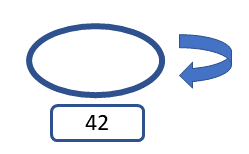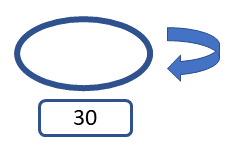C++ Core Guidelines: The Resolution of the Riddle
Today, I will solve the riddle from my last post. Thanks to my readers, the analysis of the ABA problem is quite accurate.

Only to remind you. The rule CP., 100 from the C++ core guidelines, is the starting point of the riddle.
CP.100: Don’t use lock-free programming unless you absolutely have to.
The challenge in the rule states that the following code snippet has a bug. The bug should be due to the ABA problem. The post ABA – A is not the same as A gives a concise introduction to the ABA problem.
extern atomic<Link*> head; // the shared head of a linked list Link* nh = new Link(data, nullptr); // make a link ready for insertion Link* h = head.load(); // read the shared head of the list do { if (h->data <= data) break; // if so, insert elsewhere nh->next = h; // next element is the previous head } while (!head.compare_exchange_weak(h, nh)); // write nh to head or to h
Thanks a lot to anonymous readers of my German blog; here is a runnable piece of code and a deep analysis of the issue.
#include <atomic> class Link { public: Link(int d, Link* p) : data(d), next(p) {} int data; Link* next; }; void foo (int data) { extern std::atomic<Link*> head; Link* nh = new Link(data, nullptr); // (1) Link* h = head.load(); // (2) do { if (h->data <= data) break; // (3) nh->next = h; // (4) } while (!head.compare_exchange_weak(h, nh)); // (5) }
 Modernes C++ Mentoring
Modernes C++ Mentoring
Do you want to stay informed: Subscribe.
First of all, what should this piece of code do? It creates a singly linked list of nodes (Link). Each node has a pointer and a data field. The pointer points to the next element (node->next), and the data field stores the value: node->data. Each new node is inserted into the singly linked list in such a way that data is ordered in ascending order.
The following steps are performed to insert a new node into the correct position in the singly linked list.
- Line 1: A new node is created. This is fine because the node is locally created in each thread.
- Line 2: The pointer to the head is read. The read operation is atomic; therefore, considered in isolation, the operation is also acceptable. What does isolation mean? Line 2 creates with line 5 a kind of transaction. Line 2 stores the initial state of the transaction, and line 5 publishes the transaction if nothing had changed in between.
- Line 3: Correspondingly to the previous lines, this line 3 has no issue. Only a value comparison takes place, which may end the function if the data of the head is smaller than the new data.
- Line 4: nh is local data; therefore, the assignment of nh->next is fine. It may happen head h was changed in the meantime and, consequently, nh->next does not refer to the head afterward. This is only an issue if the change is committed in the next line 5.
- Line 5: The instruction head.compare_exchange_weak(h, nh) compares the head with the stored h in line 2 and exchanges h and nh in an atomic step as soon as they are the same. If the head is not equal to h, h is set to head. Line 5 ends the atomic transaction and publishes the updated singly linked list.
What is the issue with these few lines of code? The entire transaction is based on the pointer comparison in line 5. The singly linked list can be broken if the pointer comparison can be fooled.
There is a time window between the loading of the head (line 2) and then checking if the current head is the old head (line 5). This means another thread may kick in and change in the meantime head, but the first thread is not aware of it.
Let me present a buggy sequence of events.
Breaking of the Invariant
The invariant of the following singly linked list is that data is ordered in ascending order. The blue node is the head of the list.
This is the initial structure of the list. The head has the address 0x0815.

Thread 1

- Wants to add the new node with data 42.
- 42 < 47; therefore, the new node should become the new head.
- Right before the line (5), Thread 2 kicks in.
Thread 2
- Removes the current head 47.
- Makes the node with data 60 to the new head.

- Wants to add the new node with data 30.

- Makes 30 the new head with address 0x0815; this was the former address of 47 and will often happen because of memory reuse.

Thread 1
- Makes the node with the data 42 to the new head; this is fine because line 5 compares the old with the new node, and they have the same address: 0x0815.

Now, the singly linked list is broken because the values of the nodes are not ordered in ascending order.
What’s next?
I’m nearly done with the rules of concurrency and lock-free programming. The remaining rules are about wrong assumptions about hardware/compiler combinations and the infamous double-checked locking pattern. Read about it in the next post.
Thanks a lot to my Patreon Supporters: Matt Braun, Roman Postanciuc, Tobias Zindl, G Prvulovic, Reinhold Dröge, Abernitzke, Frank Grimm, Sakib, Broeserl, António Pina, Sergey Agafyin, Андрей Бурмистров, Jake, GS, Lawton Shoemake, Jozo Leko, John Breland, Venkat Nandam, Jose Francisco, Douglas Tinkham, Kuchlong Kuchlong, Robert Blanch, Truels Wissneth, Mario Luoni, Friedrich Huber, lennonli, Pramod Tikare Muralidhara, Peter Ware, Daniel Hufschläger, Alessandro Pezzato, Bob Perry, Satish Vangipuram, Andi Ireland, Richard Ohnemus, Michael Dunsky, Leo Goodstadt, John Wiederhirn, Yacob Cohen-Arazi, Florian Tischler, Robin Furness, Michael Young, Holger Detering, Bernd Mühlhaus, Stephen Kelley, Kyle Dean, Tusar Palauri, Juan Dent, George Liao, Daniel Ceperley, Jon T Hess, Stephen Totten, Wolfgang Fütterer, Matthias Grün, Phillip Diekmann, Ben Atakora, Ann Shatoff, Rob North, Bhavith C Achar, Marco Parri Empoli, Philipp Lenk, Charles-Jianye Chen, Keith Jeffery, Matt Godbolt, Honey Sukesan, bruce_lee_wayne, Silviu Ardelean, and Seeker.
Thanks, in particular, to Jon Hess, Lakshman, Christian Wittenhorst, Sherhy Pyton, Dendi Suhubdy, Sudhakar Belagurusamy, Richard Sargeant, Rusty Fleming, John Nebel, Mipko, Alicja Kaminska, Slavko Radman, and David Poole.
| My special thanks to Embarcadero |  |
| My special thanks to PVS-Studio |  |
| My special thanks to Tipi.build |  |
| My special thanks to Take Up Code |  |
| My special thanks to SHAVEDYAKS |  |
Modernes C++ GmbH
Modernes C++ Mentoring (English)
Rainer Grimm
Yalovastraße 20
72108 Rottenburg
Mail: schulung@ModernesCpp.de
Mentoring: www.ModernesCpp.org






Leave a Reply
Want to join the discussion?Feel free to contribute!